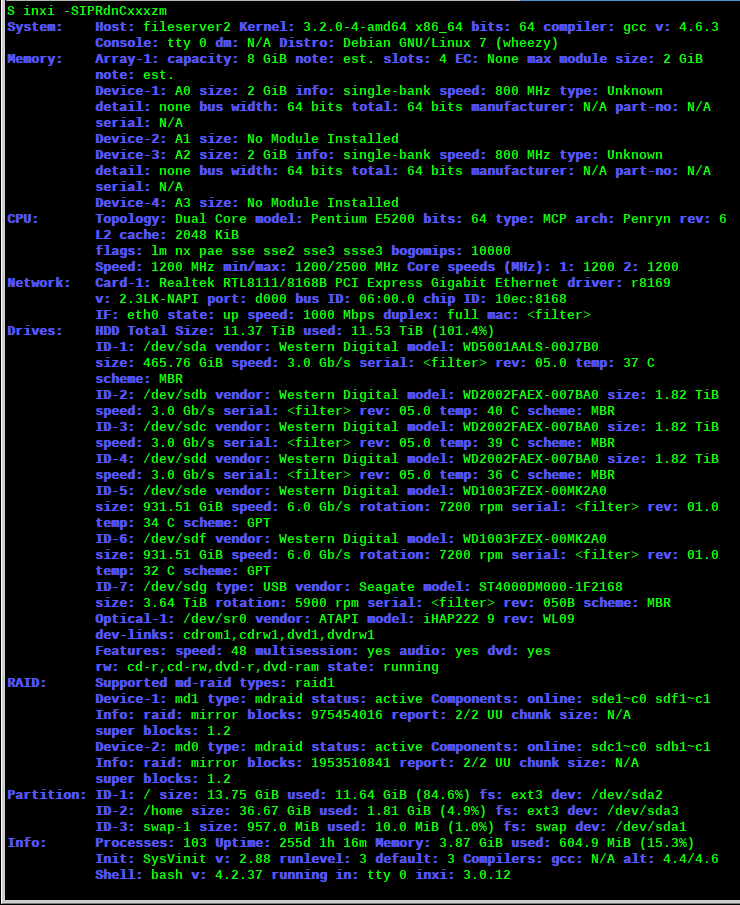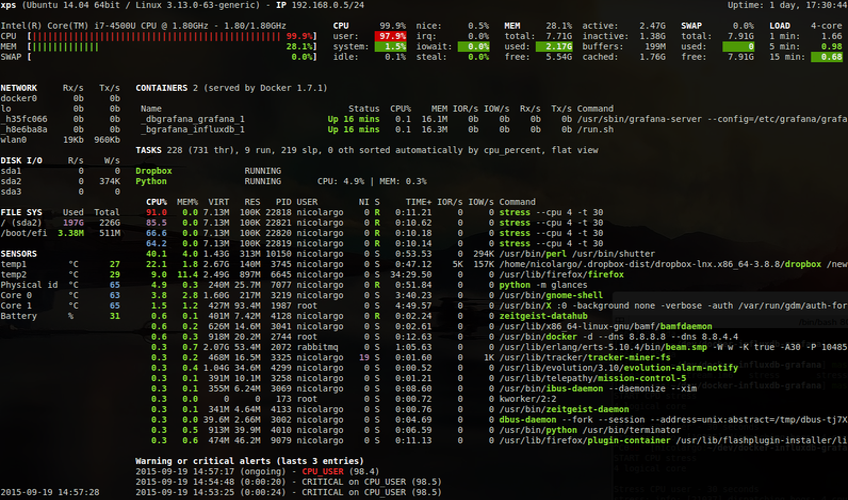132 private links

Dmidecode reports information about your system's hardware as described in your system BIOS according to the SMBIOS/DMI standard. This information typically includes system manufacturer, model name, serial number, BIOS version, asset tag as well as a lot of other details of varying level of interest and reliability depending on the manufacturer. This will often include usage status for the CPU sockets, expansion slots (e.g. AGP, PCI, ISA) and memory module slots, and the list of I/O ports (e.g. serial, parallel, USB).
In this tutorial, we are going to discuss about some good alternatives to Top command line task manager program.
Webmin is a web-based interface for system administration for Unix. Using any modern web browser, you can setup user accounts, Apache, DNS, file sharing and much more. Webmin removes the need to manually edit Unix configuration files like /etc/passwd, and lets you manage a system from the console or remotely. See the standard modules page for a list of all the functions built into Webmin.
The classical Unix utility that provides a rolling display of top cpu using processes.
Python program that reports memory usage; it can report the "proportional set size" (PSS), a meaningful representation of the amount of memory used by libraries and applications in a virtual memory system; it has built-in chart generation.
Sysdig captures system calls and events from the Linux kernel. You can save, filter, and analyze the data with our CLI or our desktop app. Think of sysdig as strace + tcpdump + htop + iftop + lsof + wireshark for your entire system.
A top-like utility to monitor the sources of power consumption; allows to turn on/off many components; quite useful to track possible power-related issues.
ngrep applies the grep logic to the network layer, allowing to match regular expressions against data payloads of packets; it recognizes IPv4/6, TCP, UDP, ICMPv4/6, IGMP and Raw across Ethernet, PPP, SLIP, FDDI, Token Ring and null interfaces.
An interactive process viewer for Unix; improves the UI of top, by adding real-time meters and colors.
"A Python program with a top like UI used to show of behalf of which process is the I/O going on".

A comprehensive system information script; provides information about CPU, graphics, audio and network devices, drives and partitions, sensors; implemented as a Bash script.

A comprehensive and detailed system monitoring tool; monitored parameters include: CPU, memory, load, process list, network interfaces, disk I/O, sensors, filesystems, docker, system info, uptime.

ttyload is a lightweight utility which is intended to offer a color-coded graph of load averages over time on Linux and other Unix-like systems. It enables a graphical tracking of system load average in a terminal (“tty“).
A small tool to provide detailed information on the hardware configuration of the machine. It can report exact memory configuration, firmware version, mainboard configuration, CPU version and speed, cache configuration, bus speed, etc.
Neofetch is a CLI system information tool written in BASH. Neofetch displays information about your system next to an image, your OS logo, or any ASCII file of your choice.
rtop is a simple, agent-less, remote server monitoring tool that works over plain SSH. Written in golang, it does not need any software to be installed on the server that you want to monitor. It works by establishing an SSH session, and running commands on the remote server to collect system metrics
A personal terminal-based dashboard utility, designed for displaying infrequently-needed, but very important, daily data.
Osquery is an open source Operating System monitoring, query, and analytics software. Created by Facebook, it exposes an operating system as a high-performance relational database that can be queried using SQL-based queries.
Osquery is a multi-platform software, can be installed on Linux, Windows, MacOS, and FreeBSD. Osquery allows us to explore the operating system profile, performance, security and many more metrics by using SQL-based queries.
Osquery is an open source Operating System monitoring, query, and analytics software. Created by Facebook, it exposes an operating system as a high-performance relational database that can be queried using SQL-based queries.
Osquery is a multi-platform software, can be installed on Linux, Windows, MacOS, and FreeBSD. Osquery allows us to explore the operating system profile, performance, security and many more metrics by using SQL-based queries.

